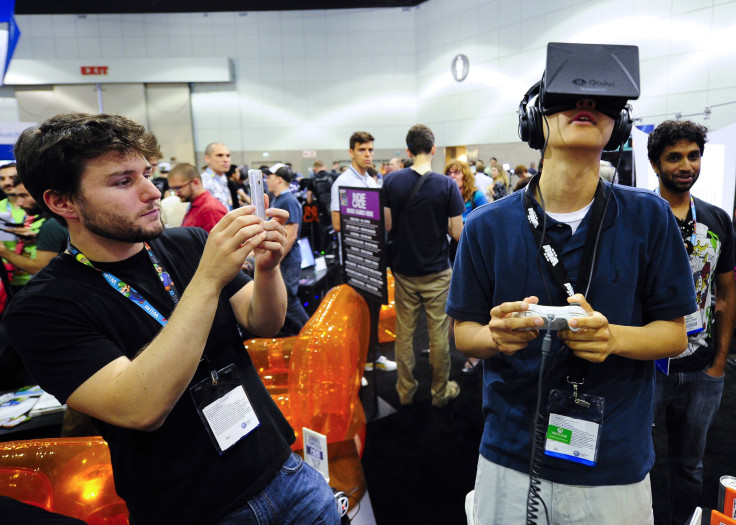Oculus Rift Backlash: Wall Street, Reddit And Kickstarter Backers Condemn Facebook Acquisition Of Oculus VR

The news that Facebook plans to purchase Oculus VR, the company behind the Oculus Rift virtual reality gaming headset, for $2 billion, rocked the entire tech world on Tuesday afternoon. And now that the Oculus team is $2 billion richer and Facebook Inc. (NASDAQ:FB) CEO and co-founder Mark Zuckerberg announced his enthusiasm for VR in a webcast, the company likely became a bigger success story for Kickstarter, the crowdfunding platform that financed its growth, than it likely ever hoped.
Not everyone was thrilled. Immediately following the announcement, there was a backlash from Wall Street, developers and early supporters of Oculus who had provided seed capital on Kickstarter.
As a West Coast-based company, Facebook announced the purchase about an hour-and-a-half after stock markets closed in New York on tuesday. Despite confident words from Zuckerburg in a phone call with investors, Facebook's stock price, which closed up for the day, slid below its Tuesday opening price of $64.25 during after-hours trading.
The slide continued on Wednesday. At the time of writing, shares of Facebook are down more than four points, or 6.5 percent.
Money talks, for sure, but a more impassioned response came from the video game and technology communities. After all, “Designed for gamers, by gamers,” was one of Oculus Rift’s selling points on Kickstarter, and many backers felt the company betrayed the grassroots, independent spirit that led them to donating.
Palmer Luckey, the founder of Oculus, explained the purchase on Reddit, promising that the Facebook acquisition will be good for video gamers.
The public reaction was far less positive.
“Palmer, as a die-hard fan and supporter since the first day that the kickstarter went live, I am legitimately disappointed by this news, not to mention your response [sic],” Reddit user “Soranma” wrote in one of the top responses to Luckey’s post.
“Everyone in the world knows there's no way Facebook buying OR is 'the best' for VR,” Reddit user “wartzilla” wrote. “It's the best for the owners of OR because it means you get to cash out. Which is fine, we all need money. Just admit it.”
There is also a worry among developers that Facebook will restrict what developers do with some Oculus technology, like the VR sex simulator that one designer made. Facebook and Oculus also promised that the VR company would remain independent, though neither company would explicitly answer whether the purchase would affect future projects from developers.
Perhaps the loudest reaction came from Markus “Notch” Persson, the designer behind the hit video game “Minecraft.” Persson was working on a virtual reality version of “Minecraft” for Oculus Rift, but he decided to pull the plug after Facebook’s announcement.
“Don’t get me wrong, VR is not bad for social,” Persson said on his blog. “In fact, I think social could become one of the biggest applications of VR.”
“But I don’t want to work with social, I want to work with games … And I did not chip in ten grand to seed a first investment round to build value for a Facebook acquisition.”
Many of these backers feel cheated because they won’t see returns on a product for which they helped build value. In the year following the Kickstarter campaign, which raised $2.4 million in September, Oculus attracted more than $100 million from angel investors who can be sure to see a massive return. Marc Andreessen and Chris Dixon joined Oculus’s board after their firm, Andreesen Horowitz, invested $75 million in a second round of funding.
Unfortunately for the Kickstarter backers, Kickstarter explicitly states that project creators keep 100 percent ownership of their projects and cannot promise financial returns or equity. All Oculus was required to do was fulfill the rewards promised for different donation amounts, which ranged from a simple “thank you” to a tour of Oculus headquarters with an Oculus Rift developer kit.
“Some projects that are funded on Kickstarter may go on to make money, but backers are supporting projects to help them come to life, not financially profit,” Kickstarter said in its “Frequently Asked Questions” section.
The response hasn't been completely negative. While Persson has hinted at taking a virtual reality version of “Minecraft” to Sony, which recently revealed plans for its own VR headset for the PlayStation 4, other developers are excited for the future. Many felt that Facebook’s resources will help Oculus, and its projects, reach consumers faster than without them.
Despite Facebook’s tumbling stock, some Wall Street analysts remain positive. Analysts at UBS were optimistic about Facebook’s purchase and praised the social network for taking early steps to invest in future platforms. The Swiss Bank set its price target for Facebook stock at $90 and called it “one of the most compelling risk/rewards in our coverage.”
Still, Oculus may have irreparably damaged its previously sterling reputation among the video game and tech communities, which could end up benefiting other VR makers.
© Copyright IBTimes 2024. All rights reserved.






















